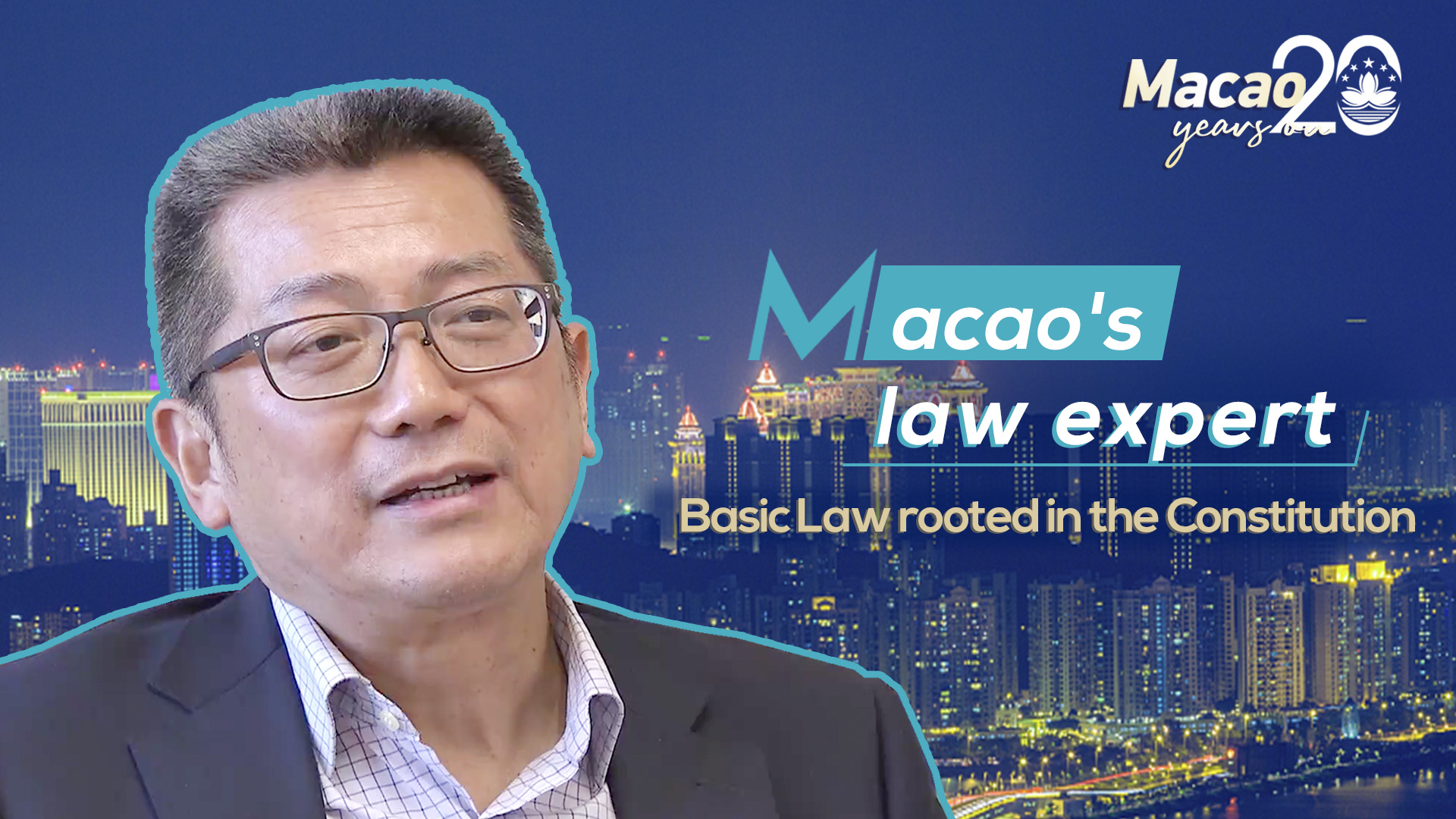The "One Country, Two Systems" principle was an idea that first came into existence in the 1970s. In the early 1980s, the then Chinese leader Deng Xiaoping put forward the concept in an effort to realize the peaceful reunification of China.
According to Deng, there is only one China – under this premise the Chinese mainland adheres to the socialist system while Hong Kong, Macao and Taiwan may retain their capitalist systems.
It has been 20 years since Macao returned to the motherland, and the "One Country, Two Systems" has been practiced in the Macao Special Administrative Region (SAR) for 20 years.
How does Macao work with the policy and does the policy run successfully there?
'One Country, Two Systems' with Macao's characteristics
Macao has been strictly abiding by the rule of law and has established a judicial and enforcement framework to safeguard national sovereignty and security, including passing a law safeguarding national security based on the Basic Law of Macao in 2009 and setting up the SAR's Safeguarding National Security Commission in 2018.
03:49

The Constitution and Basic Law of the Macao SAR are the constitutional basis for the "One Country, Two Systems" policy, Wai Kin Lok, a law expert from the University of Macau, said in an interview with CGTN, adding that the two are interconnected and consistent with each other and cannot be separated under any circumstance.
Lok explained that Macao has a high degree of autonomy and enjoys executive, legislative and independent judicial power, including that of final adjudication.
The Macao SAR was established in accordance with the provisions of Article 31 of the Constitution, which ensures the legal basis for "two systems."
"The Constitution allows the SAR to have the flexibility to formulate its own economic, social, cultural and political systems. However, these privileges are all in accordance with the Constitution," Lok noted, adding that the Basic Law is rooted in the Constitution and the SAR government must abide by the legal basis.
The "One Country, Two Systems" principle allows the Macao SAR to enjoy the benefits of "two systems" with a high degree of autonomy and it also ensures the region has strong backing from the nation.
"Whenever Macao has difficulties, the central government gives us immediate care and support to help us go through the hard times," Chui Sai On, chief executive of Macao SAR, said.
Currently, the Belt and Road Initiative (BRI), the development of the Guangdong-Hong Kong-Macao Greater Bay Area and other national strategies have provided important opportunities for Macao.
"We hope the central government and all departments will continue to provide help to Macao SAR to maintain prosperity. Macao will also try its best to make more contribution to the country," the incoming chief executive, Ho Iat Seng, said. He also expressed confidence in leading Macao to leverage its own advantages to integrate into the overall development of the country and to deepen its international cooperation.
With the central government's full support, the region successfully recovered from a severe SARS epidemic in 2003, the financial crisis in 2008 and Super Typhoon Hato in 2017. Its economy witnessed rapid growth, with a GDP of over 54.5 billion U.S. dollars in 2018, nearly eight times higher than in 1999.
Successful, and more to be done
Besides the economic data, Macao residents are the most qualified to evaluate the "One Country, Two Systems" policy as they have witnessed tremendous development since Macao returned to the motherland 20 years ago.
"Macao residents have never wavered in their confidence in the 'One Country, Two Systems,' and their feelings for the motherland have never weakened a bit. This is amazing!" said Ho Hau Wah, vice chairman of the National Committee of the Chinese People's Political Consultative Conference (CPPCC) and the first chief executive of the Macao SAR.
A poll conducted by the One Country Two Systems Research Institute with Macau Polytechnic Institute proves Ho's remarks – over 85 percent of the participants made positive comments toward the policy.
The number of participants who considered the policy to be "totally unsuccessful" and "highly unsuccessful" also decreased compared to previous surveys, according to the poll.
Meanwhile, another survey conducted in 2018 by the Macau Youth Research Association and the General Association of Chinese Students of Macao shows that there is still space for improvement.
The Constitution and Basic Law of the Macao SAR are widely promoted among all sectors of society, including school textbooks, but the legal system and political system of the Chinese mainland are aspects that Macao's middle school students know the least.
Moreover, the internet stands out as the top method for the students to learn about the mainland, the survey said.
Efforts to improve these areas are showing great potential – there are 246 pairs of sister schools between the mainland and Macao, and more than 6,300 registered Macao students studying in mainland higher education institutions, according to China's Vice Minister of Education Tian Xuejun.
Supervisor: Mei Yan
Project manager: Shan Yuan
Chief editors: Xu Jian, Pei Jian
Reporter: Zou Yun
Video editor: Zhang Rongyi
Video scriptwriter: Liu Hui
Graphics: Yin Yating